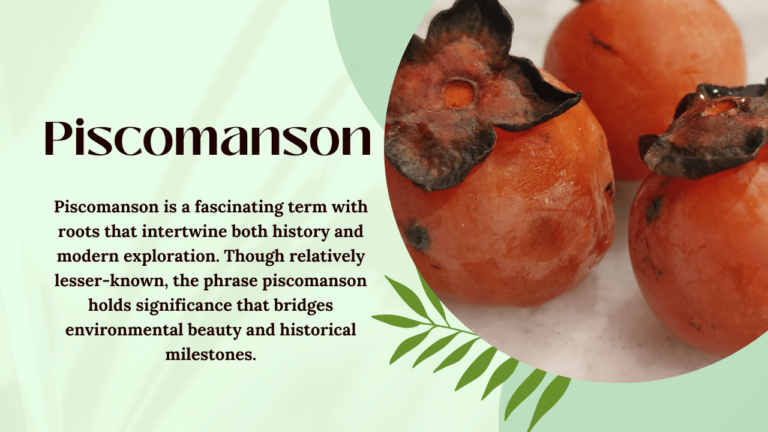Piscomanson is a fascinating term with roots that intertwine both history and modern exploration. Though relatively lesser-known, the phrase piscomanson holds significance that bridges environmental beauty and historical milestones. It is also linked to an important figure in American colonial history—John Mason, specifically through the reference john.mason piscomanson. This article delves into the cultural richness of Piscomanson, its historical backdrop, and the legacy of John Mason.
The Enigmatic Beauty of Piscomanson
Piscomanson, as a term, often brings to mind vivid images of landscapes brimming with life, natural diversity, and tranquil beauty. Situated in a region that draws adventurers and nature lovers alike, Piscomanson is recognized for its pristine environment. The location boasts rich marine life, majestic coastlines, and a variety of outdoor activities. Visitors are captivated by Piscomanson’s commitment to ecological conservation, making it a hub for environmental tourism and research.
People visit Piscomanson to enjoy diving, hiking, and exploring its vibrant marine ecosystems. Marine biologists and researchers have focused on the area’s biodiversity, making it a place where nature and science come together harmoniously. In recent years, efforts to preserve Piscomanson’s natural beauty have attracted conservationists, increasing the area’s global appeal.
John Mason and the Historical Connection
The connection between John Mason and Piscomanson, as indicated by the term john.mason piscomanson, lies in the rich colonial history of New England. John Mason was a prominent figure in early American colonialism, particularly in the 17th century. He was instrumental in founding both New Hampshire and Connecticut, playing a crucial role in shaping the future of these colonies.
John Mason’s legacy is a subject of debate today, especially because of his involvement in the Pequot War. In 1637, he led an attack on a fortified Pequot village, resulting in the massacre of hundreds of Pequot men, women, and children. While some view Mason as a key colonial leader, others see this episode as a dark chapter in American history, raising questions about how we remember such figures.
Though there is no clear indication that John Mason ever had a direct link to what is now known as Piscomanson, his ventures into New England’s unexplored regions and his relentless ambition to expand colonial territories resonate with the spirit of exploration and adventure that defines the modern-day Piscomanson.
Piscomanson’s Modern Appeal
In today’s context, Piscomanson continues to attract a broad spectrum of people—those looking for adventure, relaxation, and a deep connection with nature. This modern evolution of Piscomanson’s appeal is far removed from John Mason’s colonial exploits, as it is now centered on ecological tourism and the desire to maintain a sustainable future for generations to come.
Tourism in Piscomanson flourishes due to its eco-friendly ethos. Tourists are encouraged to take part in activities that do not harm the environment, such as snorkeling, sustainable fishing, and bird watching. For many, the allure of Piscomanson is not only in its untouched natural beauty but also in its philosophy of living in harmony with nature. This makes Piscomanson a key destination for those who prioritize environmental consciousness in their travels.
Ecological Conservation in Piscomanson
Another layer of Piscomanson’s modern relevance is its focus on marine biology and ecological conservation. Organizations dedicated to protecting marine life have turned their attention to this area, ensuring that the waters of Piscomanson remain clear, thriving, and unpolluted. The region has become a case study for sustainable tourism, showing that development can coexist with preservation.
Scientists and environmentalists work together in Piscomanson to create marine sanctuaries, and their efforts are paying off. Piscomanson’s waters are home to a diverse range of marine species, from colorful corals to vibrant schools of fish. These conservation efforts make Piscomanson a model for other regions looking to balance tourism with the preservation of natural ecosystems.
The Legacy of John.Mason Piscomanson
The term john.mason piscomanson not only evokes John Mason’s historical influence but also stands as a symbol of the evolution of places like Piscomanson over the centuries. From its colonial roots, Piscomanson has transformed into a beacon of environmental progress. While Mason’s ambitions were steeped in territorial expansion, modern-day Piscomanson focuses on protecting the world we have inherited.
The legacy of John Mason is complex. His contribution to the development of the colonies cannot be denied, but his role in violent conflicts like the Pequot War remains controversial. In contrast, the modern identity of Piscomanson is one of peace, conservation, and harmony with nature, standing in stark contrast to the turbulent history of Mason’s time.
Conclusion
Piscomanson, with its historical depth and modern appeal, serves as a reminder of the intertwining of past and present. The term john.mason piscomanson encapsulates a rich narrative, from John Mason’s colonial endeavors to Piscomanson’s current status as a haven for ecological tourism and conservation. As we move forward, the story of Piscomanson invites reflection on how places evolve, carrying with them the legacies of those who came before while offering hope for a sustainable future.
FAQs
What is Piscomanson known for?
Piscomanson is renowned for its rich biodiversity, marine life, and focus on ecological conservation, making it a popular destination for eco-tourism.
Who was John Mason in relation to Piscomanson?
John Mason was a colonial leader associated with early American settlements. While he had no direct connection to Piscomanson, his legacy in colonial history aligns with the adventurous spirit of the region.
How does Piscomanson contribute to marine conservation?
Piscomanson is a model for sustainable tourism and conservation, with efforts focused on preserving marine life and maintaining its pristine environment.
What is the modern significance of Piscomanson?
Today, Piscomanson is known for its outdoor activities like snorkeling, diving, and hiking, all centered around environmental preservation and natural beauty.
Why is John Mason a controversial figure?
John Mason is a controversial figure due to his involvement in the Pequot War, where his forces were responsible for the massacre of hundreds of Pequot people. This event is seen as a dark moment in colonial history.


